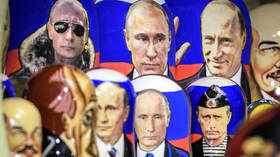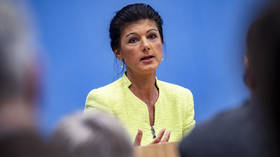EU state's leader warns of ‘Putin lookalike’ parade across Europe

European countries must not waver in their support for Kiev because Ukraine’s defeat could spawn copycats of Russian President Vladimir Putin among politicians in the EU, Romanian Prime Minister Marcel Ciolacu has warned.
Speaking to Bloomberg on Monday, Ciolacu vowed that Bucharest would continue its “multi-dimensional support” for Kiev, even despite the fatigue of the conflict and the potential adverse political ramifications of such an approach.
“These political costs are less important than the precedent a Russian victory would create,” he stressed, pointing at what he called a surging popular support for right-wing and populist parties across the continent.
“Can you imag[ine] how many Putin lookalikes we would get among certain populist European politicians?” he asked.
He lamented that EU leaders are struggling to reach a consensus on Ukraine’s accession to the bloc, given the stance of Hungarian Prime Minister Viktor Orban and his newly-elected Slovak counterpart Robert Fico. Ciolacu also warned that the EU Parliament elections scheduled for June 2024 may bring “more extremist voices in[to] the assembly,” which he said “would create a bigger vulnerability” within the bloc.
In recent months, Hungary, which is heavily dependent on Russian energy, has repeatedly criticized the EU’s Ukraine policy while refusing to supply arms to Kiev and denouncing sanctions against Moscow as detrimental to the bloc’s economy.
This approach is in many regards shared by Fico, who ran on a campaign slogan of “not a single round” to Ukraine – a promise his party kept after its election victory last month. Both countries have also opposed the EU’s €50 billion ($53.4 billion) assistance package to Ukraine.
While some Western media have branded both Orban and Fico as “pro-Russian,” Kremlin Press Secretary Dmitry Peskov dismissed the notion, suggesting that the label is being applied to those leaders who tend to “think about their nation’s sovereignty… [and] defend the interests of their country.”
A number of Western politicians have also voiced concern about growing fatigue with the Ukraine conflict. This sentiment was made public when right-wing Italian Prime Minister Giorgia Meloni admitted in a phone call with Russian prankster duo Vovan and Lexus earlier this month that European leaders are “tired” of the hostilities, adding that “we [are] near the moment in which everybody understands that we need a way out.”













